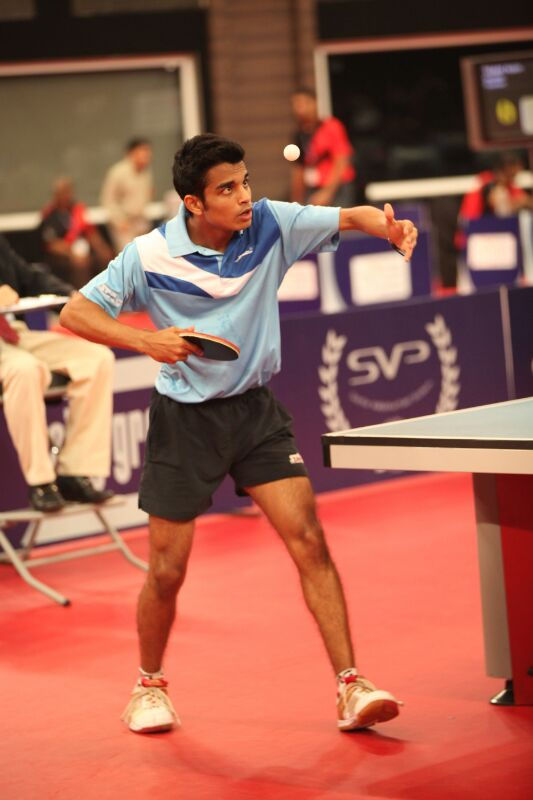Smash it like Shah: Nishaad Shah
- The Millennial Stage

- Aug 24, 2020
- 8 min read
"Don't be afraid to take chances, or someone else will."
Nishaad Shah, famously known as “that TT guy” by most of his friends, teachers and even acquaintances, is rightly called so alluding to his 14-year long experience as a table tennis player. Since he first held the table tennis racket at the age of 8, he has brought home over 200 medals and 50 trophies, while holding an honorable position on the Indian National Table Tennis team. Once shortlisted in India’s Top 4 and titled a School Games (DSO) National Champion, he reluctantly had to step back from playing professionally due to an unfortunate elbow injury. He claims to have “sports in his veins” (we’ll have to confirm this when he stabs his toe) and has chosen to take his vast experience and burning passion for sports over to the management side of the industry. Currently, he can be found pursuing his masters in sports management at an Ivy League in New York and hopes to re-unite with the Indian sports industry after graduating from the prestigious Columbia University.

How did you maintain the discipline and focus required of a professional sportsman?

It was as you would have imagined - difficult. No amount of sugarcoating can change the fact. Even though I received a lot of support from school in terms of academics, there is nothing that would or could replace the absence of school life. I’ve probably gotten the chance to savor Jamnabai vada pavs, participate in pen fights and play in an overcrowded court during lunch breaks for roughly 30 days out of the usual 365. One would say I was more absent than present for classes, field trips, school trips, and any other social event. Even though I knew many people, I didn’t really know them. My daily demanding practices would leave me with minimal time to socialize, and I graduated high school with the same few close friends that I’d started out with. Do I regret this? Absolutely not. Nobody remembers the popular guy that attended every party in 2011, but everybody remembers the guy that made it to India’s Top 4 in table tennis. And that guy is me.

I have to admit that there are times when I’ve felt lost and drained, when my body surrendered to that 5am snooze button. During such moments of weakness, I had my coaches who were the constant wind beneath my wings. They dragged me out of bed and pushed me to attain success and utilize talent that I sometimes overlooked myself. It is unrealistic to be motivated through every minute of the marathon, but it is these moments where you take the chance to slow down, and spot your cheerleaders on the sidelines, that eventually push you to sprint your way till the finish line.
What role did your family play in your journey, and how did they react to your aspirations?

My parents have been very atypical Indian parents in their unending support towards the careers taken up by my sister and me. My sister being a professional dancer, and my choice of being a professional athlete could often raise eyebrows in an orthodox Indian environment. If it weren’t for their encouragement, my trophy and medal shelves would be gathering dust.
I recollect back in the 10th grade, I had scored poorly in my prelim exams. For those of you who are not Indian, you must know that low grades are a major cause for concern. The principal called my parents as a cry for help while I was occupied with prepping for a tournament 20 days before my board exams.

Even though my parents were understandably worried, they did little to push their concerns onto me. They reassured me by telling me to do the best within my academic ability, but always reinforced their belief that I “should be the best and give my all to whatever I’m doing.” It has been unfortunate for me to see a lot of my colleagues having to quit their dreams midway due to familial pressures, and this has only heightened my respect and appreciation for my family. Due my choice of an “unconventional” career (as per Indian standards) I don’t doubt that they have been answerable to numerous judgments and criticisms by the society, but none of that came close enough to waver their upliftment towards my passion.
To top it off, my father abandoned his successful career while at his peak, to accompany me to my tournaments, travels and trainings. While I invested time, energy and effort on court, he replicated this labor off-court and, no amount of gratitude I express can be sufficient for his sacrifices.
Considering the time and commitment required to be a professional athlete, when and how did you work towards growing individually, beyond your association with sports?
In all honesty, if you saw my pictures from back in the day, you’d be lying if you said they didn’t amuse you (warning for all you fashion police!). Due to my limited exposure to social events, it took longer than it would otherwise, for me to develop a personality, and with that the social maturity that most others seemed to have developed.

My “personality puberty” might have hit later than it did for others my age but coming to New York definitely sped up the process. Here, I’m forced to abandon my shyness and I often find myself in situations that need me to stand up for what I want and believe in, whether in class or social settings. Today, I can confidently say that I’m an assertive, independent and strong individual, who has grown beyond bounds. But I also know that, to most people, I will always be known as “the TT guy” and I (secretly) love it! It might seem like table tennis has held me back from developing an individual identity beyond sports, but it’s also the only thing that has defined me and continues to do so. If you take that out of my life, I wouldn’t be able to recognize myself.

How do you find yourself reacting to losses?

When I started out at my cadet leagues, I took losses as bad as a lactose intolerant person gorging on a slice of quattro formaggi. I would sulk magnificently when my side of the scoreboard reflected a lower number than the opposite. Once, after being defeated by my opponent in a national ranking tournament, I smashed my racket and threw it across the table- all while putting up a show for the audience of 350-400 onlookers. My father made no attempts to conceal his disregard for my behaviour, and called me out “Why are you disrespecting the thing that has gotten you this far, when it is you that had full control over it?” Accepting and overcoming losses is a process that in itself defines a sportsman. This incident served as a realisation that the console of the game was in my hand, and I chose whether it ended in victory or disappointment. Over time, I have not only matured as a player but also as an individual who, at one point, could not bear to stand a loss. Now, instead of overthinking it, I divert my energy in working through what I could’ve done differently.
What caused you to discontinue the sport? How did that make you feel?

Most athletes are coerced into terminating their sports careers due to injuries, and my case was no different. Ever since I was a child, injuries were constantly looming around the horizon. Before my career even took off, I was asked to quit playing (by the best doctor in the city) due to an overgrown bone in my heel that showed no signs of slowing down. However, this setback didn’t stop me from slowing down either. I continued adding credentials as a reputed player, having landed a seat in the Top 6 of the country. At the peak of my career, while I was revelling in my achievements, I was struck with another injury. Only this time, it was a tennis elbow caused by years of excess stress and training. Despite the excruciating pain, I continued playing, and stroked my stubborn refusal to surrender. But the moment of defeat finally caught up. I dragged it to the point where I could barely control the grip over my racket. It didn’t help that this moment sprung onto me during a tournament. It was no later that I was forced to confront the intensity and extent of the situation at hand, along with the reconsideration of my entire career in table tennis.

After four long months of endless overthinking, spiralling and discussing, I decided it was time to pull the plug on my professional TT career. My mind was all hazy and it was by far one of the harder (if not hardest) forks I’ve had to overcome in my life. I wrestled so many doubts that occupied my thoughts - “What if it hurts again? What if I can’t put my best foot forward? What if I can’t play at all?” It was seemingly impossible for me to start from scratch again, and there was no guarantee that my elbow would cooperate whenever I needed it to. It felt like every time I would walk 2 steps ahead; my injury would drag me 7 steps back. I’m still unsure of whether I made the right decision, but regardless it cracked my dam of grief. If there was one other person that could possibly understand how hollow and desolate, I felt, it would be my dad. However, I know he tried his best to bury his emotions in his efforts to fully support my decision.
What plans did you have in mind since you discontinued playing professionally?

The next question ambushing me was “What next?” Forgive me for sounding mushy but my entire life had revolved around table tennis and I had never imagined what I’d be without it. I thought, “if I couldn’t play, what was the next best alternative that would keep me closely connected to my passion?” Soon after I was able to find my bearings, I held the position of a business development manager at a sports management company. It was the ideal window for me to look beyond the industry as a player, and gain exposure on the untapped potential of India’s sports industry. It was not long before I was immersed in my daily responsibilities, and constantly excited by the upcoming tournaments, leagues and competitions that were budding in the industry. I knew that my expertise as a sportsman was no substitute for experience and education if I was looking to establish myself professionally. So, without wasting another minute (just kidding, it takes months of application prep), I enrolled myself into the sports management program at Columbia University to start the next leg of my life.
Is there anything you wish was different when you played, and what are your plans for the future?
I’m currently working through the second year of my Master’s degree, while expanding my network in the industry. My once dejected self has been replaced with lots of hope and enthusiasm for what’s to come in the future! In a couple of years, you’ll see me back in India, contributing to the constantly developing league landscape, and helping underprivileged athletes in my own capacity.

During my tenure, we weren’t blessed with half as much exposure and infrastructure as the players of today. We were limited to 2-3 pro tours sanctioned by officials as the sport was not as recognised as it is nowadays. I’m pleased to see the world of table tennis emerging in the recent years, fuelled by the presence of social media, government backing and increased facilities. I’m hoping to ride this wave and give back to the sport, what it has given me - a passion to keep going.
Want to be more impressed than you already are?
Check out more of his articles and victories in the media!
"The Untold Story of International Table Tennis — Life As A Paddler with Nishaad Shah": The Lab Community
"Paddler Nishad Surprised To Be Top-Earner At MSL": Mid-Day
"Paddler Nishaad feels studying CA is a more viable option": Times of India
Nishaad Shah Achievements: SVKM Mithibai
Player profile: Stag Table Tennis Academy
Want to know more about the lifestyle of a professional athlete? Interested in the sports industry? Looking to pursue a masters in sports management?
Reach out to Nishaad!























Comments